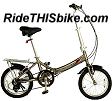RideTHISbike.com Interview With Yannick Daoudi
Long Distance Cyclist, Traveler and Film Maker
by Larry Lagarde
Yannick Daoudi loves to travel. In the year 2000, Yannick found a travel companion (Kathleen Mullin) and spent 16 weeks bicycling through China, North Vietnam, Laos & Thailand. Together, this duo have visited a variety of exotic places in Africa, Asia, Europe & South America, traveling primarily by bicycle.
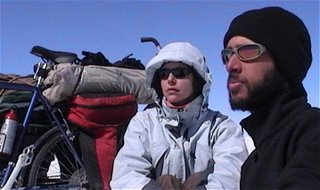 Following is my interview with Yannick. Most of the questions refer to Yannick & Kathleen's Andes Bicycle Expedition; however, anyone considering a multi-day, long distance bicycle trip should find his answers useful for planning their own bike tour.
Following is my interview with Yannick. Most of the questions refer to Yannick & Kathleen's Andes Bicycle Expedition; however, anyone considering a multi-day, long distance bicycle trip should find his answers useful for planning their own bike tour.RideTHISbike.com: Over the last 7 years, you've made at least 1 epic bike trip per year, taking 10 weeks on average to complete each trip. Anyone can imagine the amount of time it takes just to plan a short trip. What's your secret; how have you found the time year after year to make these incredible journeys?
DAOUDI: Basically, we just made it a priority in our lives. Taking time off has never been much of a problem. Since we've either been students or teachers (or both) over the past seven years, we've been lucky enough to have a couple of months off in summer and about a month for Christmas.
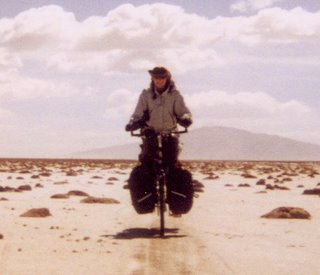 Getting the money together is trickier, but we offset the expense by the way we live day-to-day: we don't drive a car, we live in a small apartment, and in general we don't lead an extravagant lifestyle. Some people might feel it a sacrifice not to have satellite TV or a cell phone, but for us it's just superfluous. We try to live responsibly and not have too many unnecessary things. But we eat very well - Kathleen is a great cook, and we always buy organic meat, good wine, etc. We enjoy ourselves, we have a good life. We teach part-time during the year, which pays for plane tickets and costs. When we travel, we get around by bike as much as we can; we camp when it's convenient, eat local food, and usually avoid the big tourist spots. The cost of living for one month at home is equal to travelling for a month in most countries around the world. So really, the only extra is the plane ticket.
Getting the money together is trickier, but we offset the expense by the way we live day-to-day: we don't drive a car, we live in a small apartment, and in general we don't lead an extravagant lifestyle. Some people might feel it a sacrifice not to have satellite TV or a cell phone, but for us it's just superfluous. We try to live responsibly and not have too many unnecessary things. But we eat very well - Kathleen is a great cook, and we always buy organic meat, good wine, etc. We enjoy ourselves, we have a good life. We teach part-time during the year, which pays for plane tickets and costs. When we travel, we get around by bike as much as we can; we camp when it's convenient, eat local food, and usually avoid the big tourist spots. The cost of living for one month at home is equal to travelling for a month in most countries around the world. So really, the only extra is the plane ticket.RideTHISbike.com: What led you to bicycle over the Andes?
DAOUDI: Like most of our other destinations, it was based on discovering a place we knew little about but that seemed to offer us a lot to discover, from its rich Andean culture to its spectacular landscape and wilderness.
RideTHISbike.com: How did you prepare for the high altitudes of Bolivia?
DAOUDI: We're both fairly fit, but aside from that there wasn't much we could do from home to prepare for high altitude. We dealt with it once we got there, and took our time to acclimatize before heading out. I had already climbed a 6000+ m summit, so I had an idea of how well I could adapt; but we didn't know how Kathleen would feel. She was sick for about a week but was fine afterward. We acclimatized well enough, with just the occasional symptoms of high altitude sickness.
RideTHISbike.com: Since you've traveled in many remote areas, do you have any tips to share with others considering such journeys themselves?
DAOUDI: Inform yourself about the types of conditions you'll encounter, and be prepared for them. But don't obsess over high-tech, super-specialized equipment and freak out if you've forgotten something. If there are people where you're going, then there's everything you need there to live. If it's cold, they'll sell sweaters and blankets; if you're hungry, they'll have food. You don't need gore-tex, breathable, uv-resistant, quick-dry, waterproof underwear suited for life on Mars. Our tent cost us $100 and has served us well for the past 5 years. Our bikes cost us $300 each and are used/recycled bicyles. Over the years, we've added good-quality bike racks, wheels, and so on - but you don't need a $3000 bike to travel.
I would also say be flexible and don't overplan. Traveling is unpredictable, which is a huge part of its allure - to impose a rigid scheme to your experience is frustrating if not impossible. On our first cycling trip across Southeast Asia, we had planned the exact number of kilometers for every day of the first month. The whole thing was scrapped after the third day. We abandoned our kilometre-counting, and told ourselves we could always take a bus/train/boat to make our flight in Bangkok if we ran out of time.
RideTHISbike.com: Long ago when I was a student in Austria, I was "shaken down" by Italian customs officiers at the Brenner Pass. Have you ever encountered problems with customs officials when crossing a border on a bicycle? For that matter, what do you say to those in fear of being hurt, robbed, etc. on a long distance bike trip?
DAOUDI: We've never had any big trouble at border posts, at least nothing a US dollar bill couldn't fix. However we have had our share of misadventures, from a pack of hyenas surrounding our tent and keeping us wide awake the whole night, to being detained and searched by a paramilitary group in Laos when we accidentally entered a "forbidden zone".
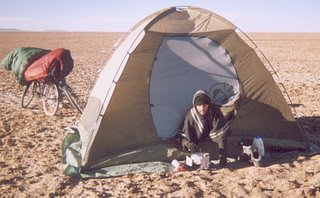 We try to avoid cities as much as we can when we travel. From our experience, these are the only places where there is a big risk. We've never felt threatened cycling through wilderness or rural communities. This will depend on the country, obviously - if you're planning a bike trip, Somalia or Iraq might not be the best idea right now. Just be aware of any political or social problems in the country you plan to visit. Most of the time it has nothing to do with foreigners anyway; even in politically unstable countries like Bolivia or Myanmar, the locals are amazing, kind, hospitable people. Using your common sense will usually keep you out of trouble: be tolerant, be humble, don't flaunt your Rolex or whip out a stack of hundred-dollar bills to buy bananas, and you should be OK.
We try to avoid cities as much as we can when we travel. From our experience, these are the only places where there is a big risk. We've never felt threatened cycling through wilderness or rural communities. This will depend on the country, obviously - if you're planning a bike trip, Somalia or Iraq might not be the best idea right now. Just be aware of any political or social problems in the country you plan to visit. Most of the time it has nothing to do with foreigners anyway; even in politically unstable countries like Bolivia or Myanmar, the locals are amazing, kind, hospitable people. Using your common sense will usually keep you out of trouble: be tolerant, be humble, don't flaunt your Rolex or whip out a stack of hundred-dollar bills to buy bananas, and you should be OK.RideTHISbike.com: Tell us about an event that stands out in your mind from the Andes trip?
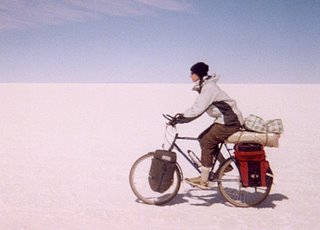 DAOUDI: Taking a walk on the largest salt desert in the world, in the middle of the night on a full moon.
DAOUDI: Taking a walk on the largest salt desert in the world, in the middle of the night on a full moon.RideTHISbike.com: Of all your trips, which was your favorite and why?
DAOUDI: That's a hard question, and Kathleen and I would answer it differently. I like large spaces, deserts, vast scenery, quiet, unpopulated places; whereas Kathleen prefers the cultural atmosphere of a place. For me, crossing the Namib desert in Southern Africa will always be a very special memory. For Kathleen, nothing can compare to cycling into the minority-populated town of Lijiang in the mountains of western China.
RideTHISbike.com: I see that you'll be selling a video from this trip on dvd. Where can someone buy the video and are you selling videos from any of your other trips?
DAOUDI: Our documentary can be ordered online at: www.y2ktravels.com/documentary It's $10 + shipping, payable with PayPal or by cheque.
RideTHISbike.com: I understand that you just returned from a bike trip in southern Chile; how did that go?
DAOUDI: It was a wonderful experience. We had heard a lot about Patagonia, but nothing could prepare us for such a unique and breathtaking place. It is clearly one of the most beautiful regions we have ever seen. Four weeks was really too short for a trip like this. The whole experience was enhanced when we were joined by a traveling companion, a dog we named Philips. He immediately became attached to us, and followed us for the last 10 days of the trip, stopping wherever we stopped and garding our tent every night. He was a great dog, we shared wonderful moments, bonded like only a dog and a human can, and letting him go at the end was one of the toughest things we ever had to do.
RideTHISbike.com: What wild adventures are you planning for the near future?
DAOUDI: That's the fun part! We have quite a long list to go through, but the next two are Northern Mongolia by horse and Northern India by motorbike.
RideTHISbike.com: How many miles did you ride per day on the Andes expedition?
DAOUDI: Not many. The conditions of the "roads" (if you can call them that) and the short winter days meant that 40km was a good day. We rarely hit the road after 11 a.m. after taking time to thaw out (the temperature dropped to -20 degrees every night), make breakfast and pack up. We needed to have found a camping spot by 5 p.m. so we could be in our sleeping bags by six, when the sun and the temperature dropped suddenly.
RideTHISbike.com: How many pounds of gear were you carrying?
DAOUDI: When fully loaded (with 10 days of food and 60 hours of water), we were carrying about 150 pounds (excluding the weight of the bikes).
RideTHISbike.com: How much water did you carry?
DAOUDI: About 15 liters of water (an autonomy of 60 hours).
RideTHISbike.com: Did you ever run out of water?
DAOUDI: Almost once, as we didn't have enough water to take us through that night and morning. But we managed to find a stagnant lake right before sunset. The water was not good at all, but filtering it and boiling it did the job.
RideTHISbike.com: How many flats did you have?
DAOUDI: None! About two or three years ago, we equipped our bikes with the Schwalbe Marathon XR tires, which are basically bulletproof. Nothing can get through them.
RideTHISbike.com: Did you have any major mechanical problems?
DAOUDI: Everything you can think of, we've had, from broken frame to broken wheel. Our gear gets punished badly on the road, from being thrown off the roof of a bus, to tumbling down a ravine...But we have chromoly frames (which can be welded in any village anywhere on the planet), and carry plenty of spare parts. And you would be amazed at what a piece of rope, some metal wires and a little creativity can fix.
For more about Yannick, Kathleen and their incredible adventures, see the free YouTube trailer for the documentary of their Andes Bicycle Expedition or visit Y2kTravels.com.
Labels: Andes Bicycle Expedition, bike tour, bike trip, Bolivia, interview, Kathleen Mullin, South America, Yannick Daoudi






